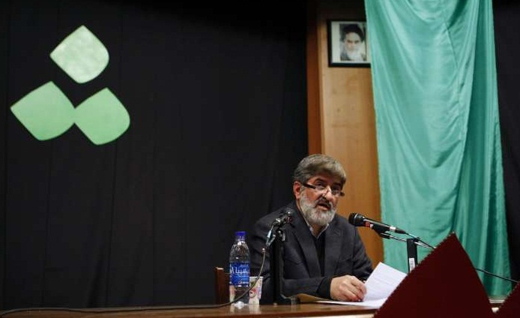On December 8, Etemad, a daily, carried an in-depth report about national University Student Day [December 7] and the speeches made to mark the occasion. The following is the translation of part of the report dedicated to a speech by Tehran MP Ali Motahari:
The speech by Ali Motahari was met with a very warm welcome. Slogans were chanted in his favor, with participants hailing him as a shining example of a true principlist. The extent of welcome even caught Motahari by surprise. The crowd was so large that organizers had to let him in through a backdoor of Chamran Conference Hall at Tehran University.
Expressing surprise over the massive turnout for the event, Motahari said in order to critique someone, some rules should be observed.
“The student movement should prepare itself to be critiqued, because it has strengths and weaknesses at the same time,” he said.
“A student is neither a layman nor a scholar, they stand somewhere in between and can plunge into ignorance without knowing it. However, students can play the role of social reformers, because they have an immaculate spirit which is typical of warriors,” he added.
Describing students as the ones who monitor social conditions, he stated, “Nothing can lead our revolution off its course. Of course, the presence of the Supreme Leader is helpful, but his presence does not reduce our obligations. Everyone who comes across injustice should roll up their sleeves and prevent vice.”
He denounced interpretations by some that the rule of the Religious Jurisprudence is a drag on freedom and said, “The problem lies with some followers of the Leader, not with the principle of the Religious Jurisprudence itself, and the Leader himself does not hold such views.”
Recalling a memory about the Supreme Leader, he said, “The Leader embraces criticism with open arms.” Nonetheless, he went on to say that when it comes to critiquing the Leader, his position as the Religious Jurisprudent should be honored, because he rules a school of thought. In the Religious Jurisprudence, it is the jurisprudent that rules not the individual.”
“Presently, anyone who expresses a contrary view is accused of being against the establishment which is wrong. Our second misinterpretation centers on how the establishment should be preserved. Unfortunately, some trample a number of principles to safeguard the establishment. They are under the wrong impression that they can do anything to protect the system. However, the principle of freedom for individuals stipulated in the Constitution forbids the arrest of people unless an indictment has been issued and a trial is swiftly held.
“Things have taken a turn for better and many people have reconciled with the establishment. Despite being harshly critical of it, they take part in annual rallies on February 11 [the victory day of the Islamic Revolution],” he said.
“It looks as if to some people everyone is a seditionist and a subverter unless proven otherwise. These are dangerous conceptions threatening the establishment. We should change our approach to preserving the establishment. I am of the opinion that a majority of students like the establishment and simply seek reforms,” he added.
He described the misinterpretation of freedom of speech as another problem, saying “Some undervalue freedom of speech. The press is the fourth pillar of democracy and can prevent a lot of offenses from happening providing that a considerable number of red lines are lifted.”
“Under the Universal Declaration of Human Rights [Article 18: Everyone has the right to freedom of thought, conscience and religion] everyone is free to think about and worship what he wants. This ideology emerged in Europe and has its roots in Medieval Inquisitorial courts. This concept is contradictory and its contradictions are reflected in the performance of the West. It is not approved of by Islam,” he cited.
Motahari, who is a member of parliament’s Cultural Committee, said, “As for the freedom of speech, strictness still persists. In the previous government, there was a harsh approach. I hope that things will be reformed; President Rouhani honors his pledges.”
When asked about the house arrest [of three people who doubted the results of the 2009 presidential election and stirred up sedition], he said, “Of course, I am not in charge of lifting the house arrest. I only follow up the case because I feel responsible as an MP and the son of a martyr.”
“We should convince each other through dialog and logic, and obstinacy coupled with commotion won’t resolve any issue,” he concluded.
